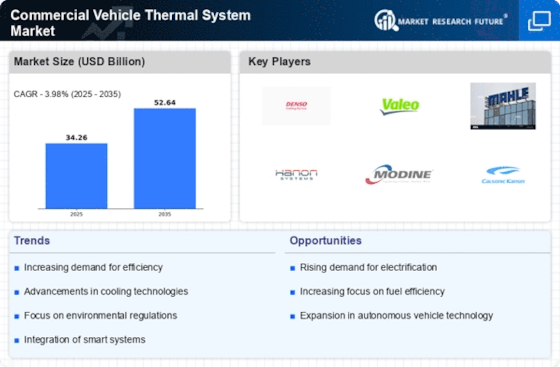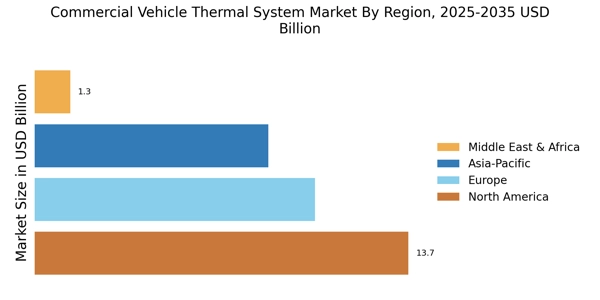Increasing Demand for Fuel Efficiency
The rising emphasis on fuel efficiency in the Commercial Vehicle Thermal System Market is driven by the need to reduce operational costs and environmental impact. As fuel prices fluctuate, fleet operators are increasingly seeking thermal systems that optimize engine performance and minimize fuel consumption. This trend is underscored by regulatory pressures aimed at lowering emissions, which compel manufacturers to innovate. The market for thermal systems is projected to grow, with estimates suggesting a compound annual growth rate of around 5% over the next few years. This growth is indicative of a broader shift towards more efficient vehicle technologies, which are essential for meeting both economic and environmental goals.
Growth of E-commerce and Logistics Sector
The rapid expansion of the e-commerce and logistics sector is significantly influencing the Commercial Vehicle Thermal System Market. As online shopping continues to grow, the demand for efficient and reliable commercial vehicles is on the rise. This sector requires vehicles that can maintain optimal operating temperatures for various goods, particularly perishables. Consequently, thermal systems that ensure temperature control and reliability are becoming essential. Market analysts project that the logistics sector will continue to expand, driving further investment in advanced thermal management solutions. This trend highlights the critical role of thermal systems in supporting the evolving needs of the logistics industry.
Regulatory Compliance and Emission Standards
The stringent regulatory landscape surrounding emissions and fuel efficiency is a major driver in the Commercial Vehicle Thermal System Market. Governments worldwide are implementing more rigorous standards to combat climate change and reduce air pollution. This regulatory pressure compels manufacturers to develop thermal systems that not only comply with existing regulations but also anticipate future requirements. The market is responding to these challenges by innovating thermal management solutions that enhance vehicle performance while adhering to emission standards. As a result, companies that prioritize compliance are likely to gain a competitive edge, positioning themselves favorably in a market that is increasingly focused on sustainability.
Technological Advancements in Thermal Management
Technological advancements play a pivotal role in shaping the Commercial Vehicle Thermal System Market. Innovations such as advanced heat exchangers, electronic cooling systems, and integrated thermal management solutions are enhancing the efficiency and reliability of commercial vehicles. These technologies not only improve performance but also contribute to the overall sustainability of the vehicles. The market is witnessing a surge in the adoption of these advanced systems, with projections indicating a significant increase in market share for companies that invest in research and development. As competition intensifies, the ability to offer cutting-edge thermal solutions becomes a key differentiator for manufacturers.
Shift Towards Electrification of Commercial Fleets
The shift towards electrification in commercial fleets is reshaping the Commercial Vehicle Thermal System Market. As more companies adopt electric and hybrid vehicles, the demand for specialized thermal management systems that cater to these technologies is increasing. Electric vehicles require efficient thermal systems to manage battery temperatures and ensure optimal performance. This transition is expected to accelerate, with forecasts indicating that electric commercial vehicles could account for a substantial portion of the market share in the coming years. Manufacturers that adapt to this shift by developing innovative thermal solutions will likely find new opportunities for growth in an evolving market.

















